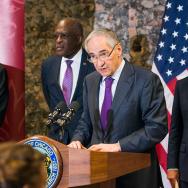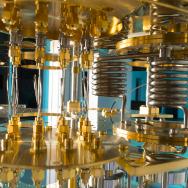The Chicago Quantum Exchange, a growing hub for the research and development of quantum technology, is adding the University of Wisconsin–Madison as its newest member.
UW-Madison is joining forces with the University of Chicago, the U.S. Department of Energy’s Argonne National Laboratory and Fermi National Accelerator Laboratory, and the University of Illinois at Urbana-Champaign in developing a national leading collaboration in the rapidly emerging field of quantum information.
The new partnership comes as UW-Madison makes significant investments in quantum science, a field with potential to revolutionize computing, communication, security and more using the powerful capabilities of quantum mechanics.
The federal government is increasingly interested in quantum technologies, launching late last year the National Quantum Initiative, which authorized an investment of more than $1.2 billion in quantum research over the next decade.
“I think quantum science is one of the most exciting areas in physics right now,” said Robert McDermott, a professor of physics at UW–Madison. “Joining the Chicago Quantum Exchange is going to put us in a very strong position in the landscape of academic institutions that are developing quantum technologies throughout the United States.”
The Chicago Quantum Exchange works toward advancing academic, industrial and governmental efforts in the science and engineering of quantum information, with the goal of applying research innovations to develop radically new types of devices, materials and computing techniques.
“Bringing UW-Madison’s expertise in qubits and quantum information to the Chicago Quantum Exchange allows us to strengthen one of the largest quantum research efforts in the U.S. and will help us accelerate scientific developments that can lead toward promising new technologies,” said David Awschalom, director of the Chicago Quantum Exchange, the Liew Family Professor in Molecular Engineering at UChicago and an Argonne senior scientist.
The Chicago Quantum Exchange’s continued growth enhances the position of the Chicago area, and the Midwest, to attract industry partnerships and government funding, while making it a leader in training the new quantum workforce.
UW–Madison has institutional research expertise in three areas of qubits, which is the basic unit of quantum information rendered as an electronic or optical device. These areas are neutral atom qubits, superconducting qubits and silicon quantum dot qubits—along with quantum sensing research being conducted by faculty such as College of Engineering Assistant Professor Jennifer Choy and Assistant Professor of Physics Shimon Kolkowitz, and condensed matter research being conducted in the Department of Physics by Professors Maxim Vavilov and Robert Joynt, Associate Professor Alex Levchenko and Senior Scientist Lara Faoro.
“We are looking forward to joint research projects within the CQE, which will give our students experience to enhance their education at UW–Madison,” said Mark Eriksson, a professor of physics at UW-Madison. “That collaboration is really important these days because a lot of expertise is needed to attack quantum computing problems from many different directions.”
As the field of quantum information science continues to grow, so will the demand for quantum engineers in industry, government and at universities. The Chicago Quantum Exchange, through its member institutions, offers both undergraduate and graduate students access to world-class expertise and research facilities in quantum science and engineering.
“Developing a next-generation quantum workforce is a huge priority nationally and worldwide,” Eriksson said. “We are training students to have this broad base of expertise that will equip them to make a high impact in this developing field of technology.”

